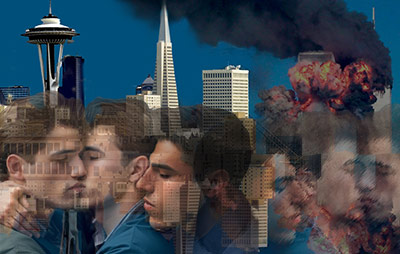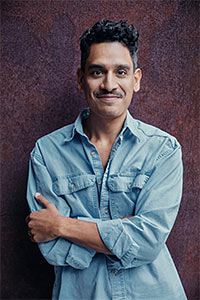ALEJANDRO VARELA
GRAND  OPENINGS*
OPENINGS*
I
Eduardo and Gus meet in college. They fall in love, move to Seattle, marry in Vancouver because their relationship isn’t recognized in the United States, adopt children, remain monogamous until their children leave for college, at which point they open up their relationship. Eduardo leaves Gus for Richard. Gus meets Antonio. All of them get along and take vacations together. When Antonio and Richard die, Gus and Eduardo reunite, at first because of loneliness and convenience, but soon for love. They live out their last days together.
II
Eduardo and Gus meet in college. They fall in love, move to NYC, and open up their relationship after two years. Gus meets Antonio, leaves Eduardo, and moves with Antonio to Seattle. Eduardo, left distraught by a breakup that dredges up the fears of rejection and abandonment sown in his high-stress, near-poverty upbringing, kills himself. Gus is overcome with guilt. Antonio eventually leaves Gus because he refuses to compete with the ghost of Eduardo.
III
Eduardo and Gus meet in college. They fall in love, move to Seattle, marry in Vancouver because their relationship isn’t recognized in the United States. Eduardo works on a reparations campaign for the long-term socioeconomic effects of slavery on Black Americans. Gus designs semiconductor chips for data-center computers. They open up their relationship after ten years. Eduardo falls in love with Richard and proposes that he come to live with him and Gus. Gus accepts because he doesn’t want to lose Eduardo, but he isn’t particularly fond of Richard, not enough to share a home with him. After a few years of living together as a trio, Gus and Richard fall in love too. They move back to the East Coast and buy a co-op apartment (2br, 2b) in Jackson Heights. They also buy a king-sized bed. Eduardo, Gus, and Richard live happily but never come out as a throuple to their respective parents. Whenever family comes to visit one of them, the other two find excuses to stay out of the apartment.
IV
Eduardo and Gus meet in college. They fall in love, but Eduardo has already accepted a Peace Corps assignment in the Ivory Coast. Gus promises to wait, but after a year meets Antonio. When Eduardo returns, he meets Gus for dinner. Antonio comes home and finds them in bed together. Antonio becomes enraged and stabs them both repeatedly before jumping from the roof of their apartment in Fort Greene. Gus and Eduardo survive the attack, move to Seattle, marry in San Francisco, and adopt two children. Gus dies young from a heart attack precipitated by aortic damage from the stabbing. Eduardo moves to New York, where he meets Richard. Eduardo’s oldest son, Felix, is incensed because he never recovered from Gus’s death. The younger child, Jules, is relieved that their father isn’t alone and eventually convinces her brother to be reasonable. After ten years of marriage, Eduardo and Richard open up their relationship.
V
Eduardo and Gus meet in college. They move to Boston. On a trip to Los Angeles to meet up with a couple with whom they’d had a foursome in New York during Pride weekend, their plane is hijacked and flown into the World Trade Center.
VI
At a weekly meeting of LGBT college students, Eduardo sits next to Gus, but when Gus gets up to use the bathroom, Eric takes his seat. Eduardo and Eric go home together. They date on and off for four years. At their five-year reunion, Gus and Eduardo officially meet for the first time. They both live in Brooklyn, seven stations apart on the G train. After six months, they move in together. After six years, they adopt one child. Three years later, they adopt another. Seven years later, Eduardo begins an affair with Richard despite Richard’s belief that reparations should only go to the descendants of enslaved people and not to all Black people. Eduardo convinces him that the effects of modern-day racism are inextricable from the socioeconomic impacts of slavery. Their affair goes on for ten months before Gus confronts Eduardo. At first, Gus asks for a divorce, but after some consideration, they determine that divorce would be too disruptive for the children. Instead, they buy the apartment downstairs and live loosely as a family. Gus and Eduardo occasionally have sex, but their relationship transitions into friendship. The children refer to Richard as Uncle Richie. Gus and Richard sleep together once, while Eduardo is at a conference in Greensboro. Neither of them ever tells Eduardo because they know he won’t take it well, and besides, it was just an itch they needed to scratch. They aren’t truly interested in one another.
VII
Eduardo and Gus’s youngest child, Jules, comes home for Thanksgiving with their partner, Nellie, and newborn (Raven), and after everyone else has gone to bed, they—Jules is nonbinary and uses all pronouns—confide in Eduardo and Gus that they and their partner have met someone (Lily, the doula who helped with Raven’s homebirth) and would like to live ensemble in a homestead community for radical queers near Burlington. Jules is afraid of telling his older brother, Felix, because Felix, to the chagrin of everyone, is a bit conservative when it comes to the social order of things. Eduardo and Gus assure Jules that Felix will be supportive and promise to talk to him if necessary. Then they set up a time to have all of them, including Lily, who they met briefly at the baby shower and soon after the birth, over for dinner. Felix, who was already uncomfortable with his fathers’ unorthodox relationship, doesn’t take the news well. I am the adopted son of a gay, transracial, and polyamorous couple, and I have a sibling who doesn’t in any way resemble me, he shouts in the courtyard of their co-op. Isn’t that enough?
VIII
In the first year of opening up their relationship, Eduardo falls in love various times. He becomes obsessive about each man he has sex with, in part because he was used to being a bottom for Gus, and is now exclusively a top. He can’t believe what he was missing. The ecstasy of providing pleasure in a more active fashion becomes addictive. At first, Gus is turned on by Eduardo’s escapades, but soon he becomes concerned with Eduardo’s mental health. On a flight to Austin, an anxious white woman signals to a flight attendant that Eduardo looks like a terrorist. An undercover US Marshall approaches him, precipitating Eduardo’s first full-fledged panic attack. The flight is grounded in Atlanta. Soon after, Eduardo begins taking anti-anxiety medications. The pills cause chronic bloody noses and numbness of the jaw. After some trial and error, Eduardo finds a treatment plan free of side effects that reduces his anxiety and makes the extramarital dating easier. From time to time, Eduardo brings home his dates and Gus participates. Gus is often content to merely watch. In their third year of an open relationship, Gus meets Antonio. When their dalliance becomes serious, Eduardo adjusts his treatment plan. Eventually things fizzle out with Antonio. After the birth of their fourth grandchild, Eduardo is diagnosed with anal cancer. The stigma and internalized Catholicism send Eduardo into a depressive spiral. He becomes especially frustrated when he finds out this could have been prevented if he’d had more frequent anal pap smears. He considers suing his primary care provider for negligence, but soon realizes that the stress of it all will only make the recovery more difficult. His remission lasts three years. Life was primarily good, he says to Gus from the hospital bed. Gus dies in a car accident on the way home from the funeral. Felix and Jules are quietly relieved that Gus won’t have to live out the pains of being a lonely widower. The grandchildren are devastated, but they recover quickly.
IX
Moral? There is no moral, but some observations about pleasure and monotony: they are powerful. They will make one do things they promised they would never do, and they will accelerate a train already in motion. At times they work in conjunction; sometimes they’re free agents. Pleasure will disrupt monotony, sure, but only momentarily. And the effort to maintain that disruption will, in most cases, lead to irreversible effects. Life continues. Until it doesn’t.
_____________
*After Margaret Atwood (“Happy Endings”)
© Alejandro Varela 2023
 This online version of “Grand Openings” appears in The Barcelona Review with kind permission of the publisher. It appears in the collection The People Who Report More Stress by Alejandro Varela, published by Astra Publishing House, 2023.
This online version of “Grand Openings” appears in The Barcelona Review with kind permission of the publisher. It appears in the collection The People Who Report More Stress by Alejandro Varela, published by Astra Publishing House, 2023.
This story may not be archived, reproduced or distributed further without the author's express permission.
Please see our conditions of use.
Author Bio
 Alejandro Varela (he/him) is based in New York. His work has appeared in The Point Magazine, Boston Review, Harper’s Magazine, The Rumpus, and The New Republic, among many others. He is a 2019 Jerome Fellow in Literature and is an editor-at-large of Apogee Journal. His graduate studies were in public health. His debut novel, The Town of Babylon (2022), was published by Astra House and was a finalist for the 73rd National Book Awards. His work can be accessed at alejandrovarela.work and on X and IG: @drovarlea
Alejandro Varela (he/him) is based in New York. His work has appeared in The Point Magazine, Boston Review, Harper’s Magazine, The Rumpus, and The New Republic, among many others. He is a 2019 Jerome Fellow in Literature and is an editor-at-large of Apogee Journal. His graduate studies were in public health. His debut novel, The Town of Babylon (2022), was published by Astra House and was a finalist for the 73rd National Book Awards. His work can be accessed at alejandrovarela.work and on X and IG: @drovarlea
author photo by Allison Michael Orenstein
The Barcelona Review is a registered non-profit organization